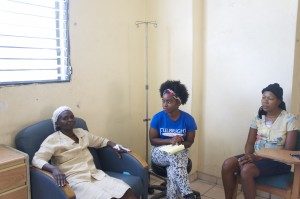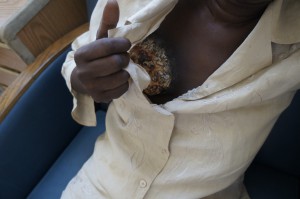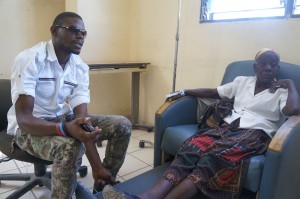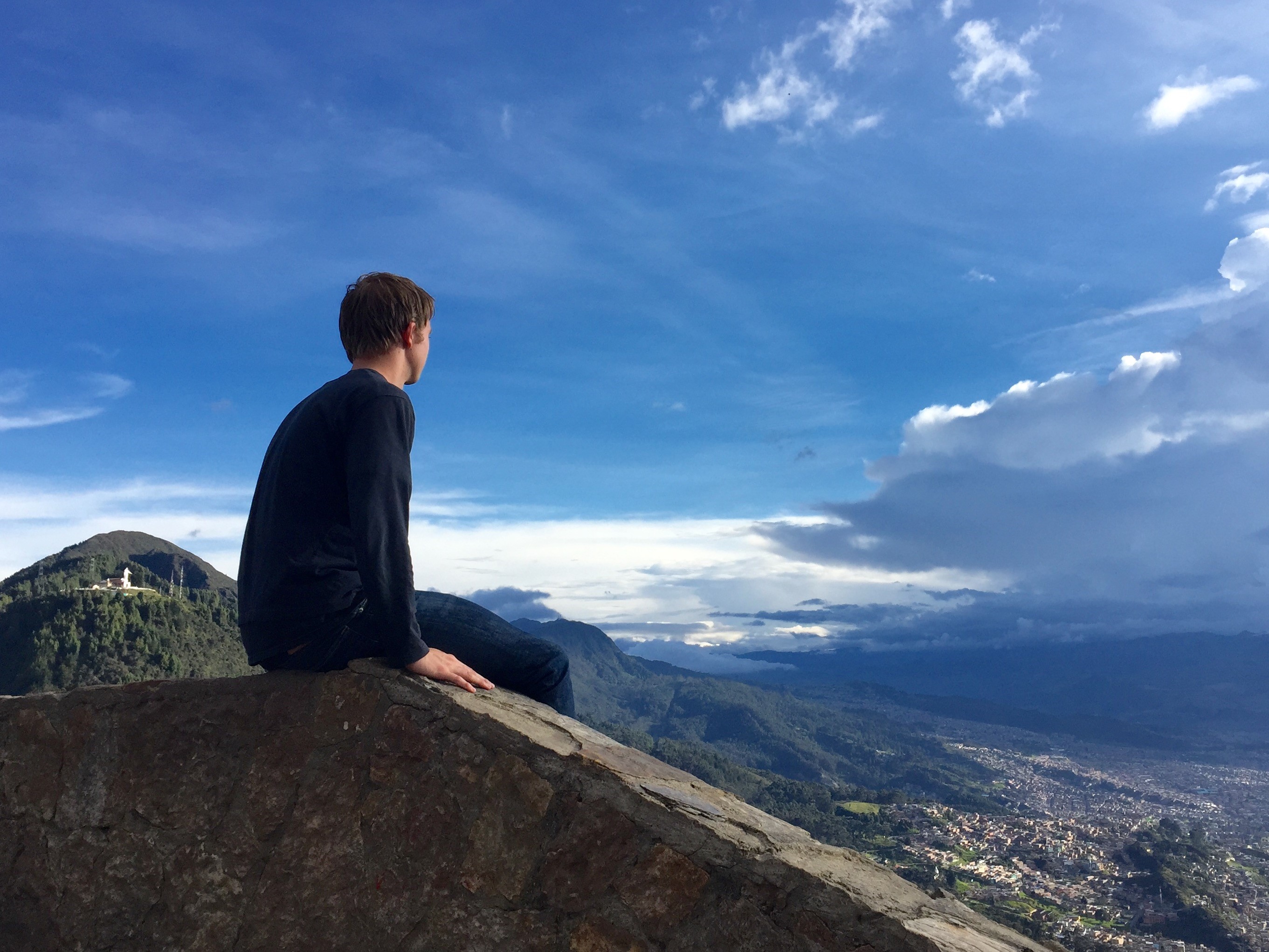
Martine Prompt, 2015-2016, Fulbright-Clinton Fellow to Haiti (center), discusses the socioeconomic impact of cancer with patients Madame Louis (left) and Melissa (right)
In honor of World Cancer Day, 2015 to Haiti Martine Prompt shares her cancer awareness work with Project Medishare as part of her overall grant objective to improve the health literacy skills of vulnerable populations as a means towards improving their overall health, and promote health equity.
“Mwen pè maladi sa, mwen pè mouri pou pitit mwen yo, men mwen gen espwa poum geri paske mwen gen konfyans nan Letènèl, sa banm plis espwa.”
“I am afraid of this disease. I fear death because of my children, but I have hoped that I’ll heal because I have faith in the Lord – that gives me more hope.”
Madame Louis and four other women sat on the chemo chair in the cancer center at Bernard Mevs Hospital as their nurse prepares them to receive their infusion. Madame Louis is a middle aged woman with a malignant tumor that was undiagnosed and untreated for a long time. In the place where her right breast should be, there is a cauliflower-shaped tumor growing through her skin. She pointed at it for me to look but she looked away, sad, angry, and shamefaced. Such enormous tumors are rare in developed countries, yet typical in Haiti. The women at the cancer center are trapped by poverty, misinformation, and stigma, which often lead to them not seeking help for breast cancer. Many are diagnosed with late-stage breast cancer when the prognosis for survival is poor. Madame Louis confirms, she has never performed a self-breast exam, nor had a mammogram. She was diagnosed, when she showed a doctor that she had blood coming out of her nipples. “Yo dim se cancer ke mwen genyen, kounye a map tann gerizon. Yo dim map geri.” (They told me I have cancer, now I’m waiting for a cure because they told me I will be cured.)
Studies confirm that breast cancer is a leading cause of death and disability among women, especially young women in low-and middle-income countries. According to the International Agency for Research on Cancer (IARC), part of the World Health Organization (WHO), low-and middle-income countries like Haiti, accounted for 57% of the 14 million people diagnosed with cancer worldwide in 2012—but 65% of the deaths. Today, cancer kills more people in poor countries than AIDS, malaria and tuberculosis combined. The high fatality rates are likely due to a lack of awareness of the benefits of early detection and treatment and a scarcity of adequate facilities for detection, diagnosis, as well as treatment.

Madme Louis, breast cancer patient, showing an advanced cauliflower-like mass on her breast at Bernard Mevs Hospital cancer center
Similar to Madame Louis, Melissa is a 32-year-old young woman, battling advanced breast cancer. She discovered a lump in her breast while taking a shower, “tetem te gen on bagay ki pa normal.” Assuming she was too young to have cancer, she sought the advice of family and friends. They told her it was hardened milk from breastfeeding her youngest child. Melissa took on their advice and started self-medicating with herbal concoctions to help the problem. Fortunately for Melissa, her maternal first cousin was diagnosed with breast cancer and she recalled attending treatments with her and decided to seek medical advice for the growing lump on her breast. Her doctors are hopeful that treatment could cure her and prolong her life.
During our conversation, most of the women admitted that they were not screened for cancer and they all tell stories of finding lumps in their breast, ignoring them, and hoping that they would go away. One patient, Marie, admitted that she sought many traditional healers before going to see a doctor. Frustrated that the healers were not curing her, she finally saw a local doctor. At 78-years-old, Annette was the only patient of the five women that had a mammogram. She had had a persistent cough and saw a local doctor who prescribed cough medicine and told her she was fine. She thought she had pneumonia, but the lump on her breast grew bigger. Then a friend “dim se Bernard Mevs poum ale trete” (told me that I have to go to Bernard Mevs for treatment). She saw a foreign doctor that requested she have a mammogram and later a biopsy, both of which confirmed she had breast cancer.
Mammography and other expensive, technologically complicated resources and therapies, will not likely be available to many women in Haiti. Screening for cancer is difficult both for patients and medical providers. A mammogram cost approximately 2,000 HTG, for the average person, this represents a major sacrifice. According to the World Bank, about 59% of the Haitian population earns less than $2USD per day and 25% of the population lives in extreme poverty earning less than $1.25 daily. Further, in Haiti doctors must be adaptable. To treat cancer, an oncologist is needed, but there are a limited number of in-country oncologists that could readily screen and treat patients. Haiti’s current healthcare system suffers from a lack of qualified healthcare professionals; moreover, cancer care tends to be centralized in cities like Port-au-Prince and Mirbalai (Partners In Health hospital). Meeting these challenges requires sufficient trained and knowledgeable staff with clinical expertise that can screen and treat patients.
Education about breast cancer, including skilled breast physical examinations, advocacy around curability, is strongly needed in Haiti. The majority of Haitians have low health literacy competencies, which makes it difficult for them to make healthy decisions, participate in health promotion and prevention, and avoid risky behavior. None of the women could define cancer when asked “kisa ou panse cancer ye,” they all responded, it was a disease that kills. Almost all the patients I talked to agreed that they want to know more about cancer, but that they don’t have access to that information. Cancer doesn’t necessarily kill if caught and treated early, but lack of access to information can produce such a reaction. Education efforts need to address the reality that many women, particularly those with less income and education, may not seek care when they feel a breast mass because they are unaware of what it represents. None of the women I spoke to knew that lifestyles factors such tobacco consumption, high calorie diets (obesity) and alcohol abuse are associated with several forms of cancer. However, the oldest women in the group believe getting or not getting cancer was due to luck, and that those diagnosed with cancer were unlucky.
Further, for younger women like Melissa, a breast cancer diagnosis has high impact on self-image. As a 32-year-old, Melissa admits she was concerned about the stigma of cancer and being rejected by her community. “Moun yo pa konn sa cancer ye e mwen pa gen ase infòsyon poum ta ba yo.”(People have no knowledge of cancer, and I don’t have enough information to share with them.) Melissa also talked about her altered physical appearance and the fear of being rejected by intimate partner although she is not currently in a relationship, but in the future, “Lèm jwen on moun mwen papa alèz.” (When I meet someone, I will be uncomfortable). Melissa’s concerns about a future spouse and social support add to the mounting evidence that social isolation increases risk for cancer progression and earlier mortality.

Marie’s nephew explains how he supports his aunt during her cancer treatments
Research overwhelmingly shows that social support is critical for cancer patients. The women I interviewed today have strong support systems provided by their family and friends. Marie has recurrent breast cancer and today, her nephew took her for Chemotherapy. Her nephew, who she refers to as “piti gasonm,” was by her side six years ago when she went through treatment for breast cancer. Marie refers to her nephew as her everything. He laughs, they have very good chemistry. Marie appeared sad when she revealed to me that she never married nor had children. He is my nephew, my son and my husband. He agreed, “Mwen responsab li jiska lamò.” (I’m responsible for her until death do us apart.) Marie laughed uncontrollably, for a moment she didn’t seem afraid to die, she didn’t seem to care that she was without a husband or “children.” In her eyes, she felt supported and loved.
Unfortunately, just at the time when cancer patients need more social support, they often get less. The woman sitting next to Marie laughed and told her, “I have nine kids but they are all struggling to accept that I have cancer. No one in my family had cancer.” In Haiti, many people are uncomfortable with the “C” word. It is often considered a taboo to have cancer. Not only do patients tend to deny and withdraw, but also friends and acquaintances don’t have the knowledge to show adequate support. Despite not accepting her diagnosis she agreed that her “fanmi’m yo pa imilyem yo tolerem epi yo fe sa yo kapab.” (My family tolerates me; they show support and do whatever they can to help.) Love was all around the room when the oldest patient was sitting holding her younger sister’s hand. They are a few years apart, she refers to her sister as her “poto mitan”(pillar) and the sister agreed that it wasn’t only Annette’s problem but it was “problem nou, problem tout fanmi an.”
Melissa sat in the corner alone, her head bowed down. She smiles from the corner of her mouth, not a genuine smile; a polite one to acknowledge my presence. During our conversation, Melissa reveals to me that she has no one but her two young children. Melissa has had a mastectomy, she is undergoing chemo and will be on Temoxafen as part of her treatment. Melissa’s family lives en province and her church family is her moral, social and financial support. As the youngest woman in the room, Melissa feels the profound socioeconomic burden of cancer. She cried that she needs support, that she is unable to afford the basic necessities “mwen konn pase on jounen san manje sam genyen se timoun yo mwen bay li.” (Some days I go without food, I give all that I have to my children.) Since being sick consumes her time, she can’t find housekeeping work. Poor cancer sufferers are not only more likely to lack access to adequate treatment, but also more likely to suffer pain and financial distress. The realities of her life support the vicious cycle of poverty, hunger, education, knowledge, and access to care. Even in developed countries, like the United States, social factors account for a significant part of the total burden of disease in the population – and is even worse for low income countries. Social health inequalities are avoidable and require a robust policy implementation.
Over the years, low and middle-income countries have made great strides in the fight against communicable diseases. The same attention and care needs to be brought to chronic non-communicable diseases such as cancer. The first five Sustainable Development Goals (SDG): eradication of poverty, hunger, health, education and gender equality are important in the fight against cancer in Haiti. Unfortunately, the majority of foreign aid is geared towards infectious diseases, which are no longer major challenges. Screening and treating cancer appears to be the logical thing to do; however, in my discussions with other public health professionals they often express that screening is somewhat unethical because treatment is not readily accessible and can be costly. It is agreeable that a stronger public health infrastructure is needed to combat cancer and prevent cancer globally.
As a Fulbright Clinton-Fellow, my work is challenging yet rewarding, prospective fellows will find that their talents are needed to promote social justice and global health equity. The Ministry of Health and Hospital Bernard Mevs (run by Project Medishare in cooperation with Equal Health International) are working to improve cancer screening and treatment in Haiti. A pathology lab is being built, and now cancer patients can access care throughout the country. In the past, care was centralized in Haiti’s capital, Port-au-Prince, and patients from remote parts of the country had to travel to Port-au-Prince for treatment. Fortunately, this is no longer the case, and soon the HPV vaccine will become available to young girls. The ministry continues to work on improving data collection and educating women to take charge of their health because with “kansè pi bone, se granm maten.” (The earlier, the better.)
Women like Melissa, Marie, Madame Louis and Annette, with breast cancer so advanced that they have a small window of time, but they are filled with hope. On World Cancer Day, all of the women want the world to pray for hope and for those without cancer to support those with cancer.
For more information on how to help, please click here.


No Comments